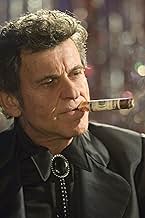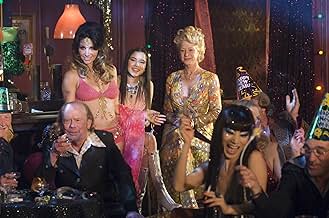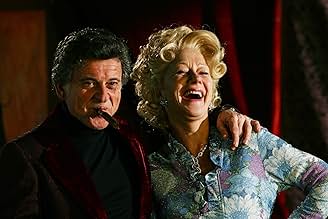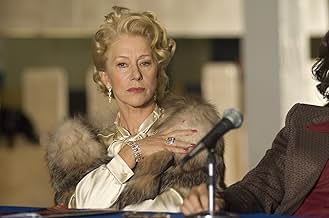ÉVALUATION IMDb
5,6/10
3,4 k
MA NOTE
Un film dramatique racontant l'histoire d'un couple marié qui a ouvert le premier bordel légal au Nevada.Un film dramatique racontant l'histoire d'un couple marié qui a ouvert le premier bordel légal au Nevada.Un film dramatique racontant l'histoire d'un couple marié qui a ouvert le premier bordel légal au Nevada.
- Prix
- 1 victoire et 1 nomination au total
Raoul Max Trujillo
- Hernan Prado
- (as Raoul Trujillo)
Histoire
Le saviez-vous
- AnecdotesThe second time that real-life husband and wife Taylor Hackford and Dame Helen Mirren have worked together on a movie. The first time was Soleil de nuit (1985).
- GaffesAt the beginning of the film, Charlie and the band are performing to a packed house. The drummer uses a crash cymbal from the very popular Zildjian company, the A Custom. This movie takes place in 1976, and the Zildjian A Custom didn't come out until 1990.
- Citations
[first lines]
Grace Bontempo: Selling love will make you rich. That's what my mother taught me. Just don't put your heart in it.
- Bandes originalesI Just Want to Make Love to You
Written by Willie Dixon
Performed by Foghat
Courtesy of Bearsville Records/Rhino Entertainment Company
By arrangement with Warner Music Group Film & TV Licensing and by arrangement with Victor Entertainment, Inc. for Japan
Commentaire en vedette
Picture a caricature of everything that America, at some level, holds dear, yet despises. Think bling, brash, frantically optimistic and determinedly selfish, and you have the main character typecast by a weathered Joe Pesci. Add to the mix an insecure, yet intelligent and reasonably efficient brothel "madam" who is trapped by economics and an irresponsible, hyperactive, and deliberately delusional husband, and. you have a marriage which must resonate across the globe.
The film opens with an ironic and trite hope for the future. Auld Lang Syne is sung at a New Year's Eve party, which Robert Burnes, no stranger to joys of the flesh himself, would possibly have avoided. A stark naked man who has transcended the bounds of good taste, and possibly the law, is driven by the "Madam" (Helen Mirren) into the waiting furniture wielded by her husband, Pesci. The tame police in attendance remove the problem and the party continues.
Gradually the dynamics of the Pesci/Mirren relationship are revealed. She actually likes her charges and comforts herself in the knowledge that she is keeping them off the streets.
He struts around like a dove with an over-inflated breast, a disgustingly showy car with the vanity plate "LUV SEX", and the nickname of "Mr Good Times". He is a man whose very posture suggests violence, and he has only to threaten to smash the home telephone, her link to the outside world, to ensure that her timid attempt at rebellion turns into a whimpering desire to please him.
Pleasing him in the only way he understands is not that easy as she is older than the available nymphets and is very aware that his sudden business calls are not to any office block. The marriage of financial and social convenience could, theoretically, have lasted for years, as many convenient couples will attest, but reality has the unpleasant habit of intruding. A visit to the doctor and plastic convenience is stripped away. The selfishness of her husband is expertly conveyed in his answer to her questioning his love for her. "I *** love you," he says, "I could have never found a woman as loyal as you to take my s***." It says everything that he is totally unaware of the egocentric nature of his declaration of love.
Later, when their world is falling apart, and she is experiencing loss, and almost claustrophobic grief,he rails at her that she doesn't know what the **** he went through all night.
The tragic moment which announces the end of the film is justified by the quality of the acting. Yes, this could happen, and be a small article on the front page of the morning newspapers, but the film has made its point before the actual violence. It is all about self, the need for self-validation at the expense of others, the need to be desirable, the need to be in control, and even the need to be physically dominant while all these have inevitably and irrevocably been taken away by time.
It is a film worthy of a second viewing, if only to enjoy the performance of Pesci (which he has reprized from Goodfellas) and the revelation which is Helen Mirren. That she could go from the ultra- British role as the Queen to this, without a trace of genteel accent, but retain all the pathos of a woman who wants to love her husband and her life, is remarkable. Even the director gives her credit in an in- joke. When her husband dons a hat in keeping with his personality, she asks him who he thinks he is, 'Clint Eastwood'. He replies: "Who do you think you are? The Queen of England?"
Eminently watchable, character-driven, and filmed with an understated slickness, this is a film which might, regrettably, not set the box office alight, but which is very worth viewing for so many reasons. True, there are elements that echo events in some well-known films, which my spoiler-conscience prevents me from naming, but it is safe to say that this film strips the sentimentality from such and is the better for it. Taylor Hackford, I look forward to your next.
The film opens with an ironic and trite hope for the future. Auld Lang Syne is sung at a New Year's Eve party, which Robert Burnes, no stranger to joys of the flesh himself, would possibly have avoided. A stark naked man who has transcended the bounds of good taste, and possibly the law, is driven by the "Madam" (Helen Mirren) into the waiting furniture wielded by her husband, Pesci. The tame police in attendance remove the problem and the party continues.
Gradually the dynamics of the Pesci/Mirren relationship are revealed. She actually likes her charges and comforts herself in the knowledge that she is keeping them off the streets.
He struts around like a dove with an over-inflated breast, a disgustingly showy car with the vanity plate "LUV SEX", and the nickname of "Mr Good Times". He is a man whose very posture suggests violence, and he has only to threaten to smash the home telephone, her link to the outside world, to ensure that her timid attempt at rebellion turns into a whimpering desire to please him.
Pleasing him in the only way he understands is not that easy as she is older than the available nymphets and is very aware that his sudden business calls are not to any office block. The marriage of financial and social convenience could, theoretically, have lasted for years, as many convenient couples will attest, but reality has the unpleasant habit of intruding. A visit to the doctor and plastic convenience is stripped away. The selfishness of her husband is expertly conveyed in his answer to her questioning his love for her. "I *** love you," he says, "I could have never found a woman as loyal as you to take my s***." It says everything that he is totally unaware of the egocentric nature of his declaration of love.
Later, when their world is falling apart, and she is experiencing loss, and almost claustrophobic grief,he rails at her that she doesn't know what the **** he went through all night.
The tragic moment which announces the end of the film is justified by the quality of the acting. Yes, this could happen, and be a small article on the front page of the morning newspapers, but the film has made its point before the actual violence. It is all about self, the need for self-validation at the expense of others, the need to be desirable, the need to be in control, and even the need to be physically dominant while all these have inevitably and irrevocably been taken away by time.
It is a film worthy of a second viewing, if only to enjoy the performance of Pesci (which he has reprized from Goodfellas) and the revelation which is Helen Mirren. That she could go from the ultra- British role as the Queen to this, without a trace of genteel accent, but retain all the pathos of a woman who wants to love her husband and her life, is remarkable. Even the director gives her credit in an in- joke. When her husband dons a hat in keeping with his personality, she asks him who he thinks he is, 'Clint Eastwood'. He replies: "Who do you think you are? The Queen of England?"
Eminently watchable, character-driven, and filmed with an understated slickness, this is a film which might, regrettably, not set the box office alight, but which is very worth viewing for so many reasons. True, there are elements that echo events in some well-known films, which my spoiler-conscience prevents me from naming, but it is safe to say that this film strips the sentimentality from such and is the better for it. Taylor Hackford, I look forward to your next.
- mckn
- 3 juill. 2011
- Lien permanent
Meilleurs choix
Connectez-vous pour évaluer et surveiller les recommandations personnalisées
Détails
- Date de sortie
- Pays d’origine
- Site officiel
- Langue
- Aussi connu sous le nom de
- Ljubezenski ranc
- Lieux de tournage
- sociétés de production
- Consultez plus de crédits d'entreprise sur IMDbPro
Box-office
- Budget
- 25 000 000 $ US (estimation)
- Brut – États-Unis et Canada
- 137 885 $ US
- Fin de semaine d'ouverture – États-Unis et Canada
- 44 220 $ US
- 4 juill. 2010
- Brut – à l'échelle mondiale
- 146 149 $ US
- Durée1 heure 57 minutes
- Couleur
- Mixage
- Rapport de forme
- 1.85 : 1
Contribuer à cette page
Suggérer une modification ou ajouter du contenu manquant

Lacune principale
By what name was Love Ranch (2010) officially released in India in English?
Répondre





































